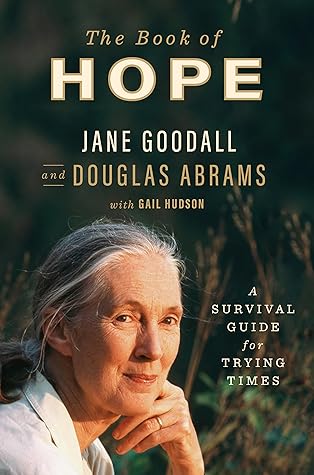More on this book
Community
Kindle Notes & Highlights
by
Jane Goodall
Started reading
October 18, 2025
Hope is often misunderstood. People tend to think that it is simply passive wishful thinking: I hope something will happen but I’m not going to do anything about it. This is indeed the opposite of real hope, which requires action and engagement.
an evening tot of whisky is a nightly ritual and an opportunity to relax and, when possible, toast with friends.
“Hope,” Jane said, “is what enables us to keep going in the face of adversity. It is what we desire to happen, but we must be prepared to work hard to make it so.”
“Actually, it’s a survival trait,” she finally concluded. “That’s what it is. It is a human survival trait and without it we perish.”
When we focus on the future, we do one of three things. We fantasize, which involves big dreams that are mostly for fun and entertainment; we dwell, which involves focusing on all the bad stuff that might happen—this was the official pastime of my hometown—or we hope, which involves envisioning the future while recognizing the inevitability of challenges. Interestingly, more hopeful people actually anticipate setbacks along the way and work to remove them.
“Hope does not deny all the difficulty and all the danger that exists, but it is not stopped by them. There is a lot of darkness, but our actions create the light.”
“I guess the depth of our grief is a reminder of the depth of our love.”
“I remember you also telling me in Tanzania that octopuses are extraordinarily clever and can solve all sorts of problems even though their brains are structured so differently from mammalian brains,” I said. Jane laughed. “They actually have brains in each of their eight arms! Here’s something else you’ll like—apparently you can teach bumblebees to roll a little ball into a hole for the reward of a drop of nectar. And even more remarkably—other bees, who have not been trained, can perform the same task after merely watching the trained bees. We are learning new things all the time and I
...more
“That’s why I say ‘intellectual’ rather than ‘intelligent.’ An intelligent animal would not destroy its only home—which is what we have been doing for a very long time. Of course, some people are indeed highly intelligent, but so many are not. We labeled ourselves Homo sapiens, the ‘wise man,’ but unfortunately there is not enough wisdom in the world today.”
One could argue that the human intellect was the greatest mistake in evolution—a mistake that is now threatening all life on the planet.”
“Are we fifty-one percent good or fifty-one percent evil?” “Well, there’s plenty of evidence for both sides of this debate, but I think we’re split down the middle,” Jane said. “Humans are incredibly adaptive and will do whatever is required to survive in their environment. The environment we create will determine what prevails. In other words, what we nurture and encourage wins.”
“So children learn the moral values of their society,” I said. “Yes, and this makes human aggression worse than that of other species because we may act aggressively knowing full well that it is morally wrong—at least what we believe is morally wrong. For this reason I believe that only humans are capable of true evil—only we can sit down and, in cold blood, work out ways to torture people, to inflict pain. Carefully plan horrific cruelty.”
Unfortunately, the media devotes so much space to covering all of the bad, hateful things that are going on and not enough to reporting about all the goodness and kindness that’s out there.
“First—we must alleviate poverty. If you are living in crippling poverty, you will cut down the last tree to grow food. Or fish the last fish because you’re desperate to feed your family. In an urban area you will buy the cheapest food—you do not have the luxury of choosing a more ethically produced product. “Second, we must reduce the unsustainable lifestyles of the affluent. Let’s face it, so many people have way more stuff than they need—or even want. “Third, we must eliminate corruption, for without good governance and honest leadership, we cannot work together to solve our enormous social
...more
True wisdom requires both thinking with our head and understanding with our heart.”
“What have we forgotten—or chosen to ignore?” “That there’s intelligence in all life,” Jane said. “I think indigenous people sense this when they talk about animals and trees being their brothers and sisters. I like to think that our human intellect is part of the Intelligence that led to the creation of the universe. Take the trees! We now know that they can communicate information to one another through underground networks of roots and the thin white threads of the microfungi that are attached to them.”
Every day we make some impact on the planet. And the cumulative effect of millions of small ethical actions will truly make a difference.
Jane then explained how the gray wolf was wiped out a hundred years ago throughout most of North America. In Yellowstone, with the wolves gone, the elk overgrazed the park and the ecosystem suffered. Mice and rabbits could not hide, as the underbrush was gone, and their numbers plummeted. Bees had fewer flowers to pollinate. Even grizzly bears did not have enough berries to eat to prepare for their hibernation. The wolves had kept the elk away from the riverbank where they were exposed and vulnerable to attack. Without the wolves, the elk spent more time by the river, and the hooves of the
...more
I personally believe that animals have as much right to inhabit this planet as we do. But also that we are animals as well,


